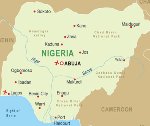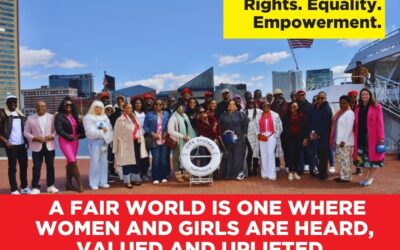The Nigerian government announced Wednesday it has set up a board of inquiry to investigate a multi-million dollar bribery scandal involving American company Halliburton and allegedly implicating two former Nigerian presidents. Earlier this year Halliburton reportedly admitted that it had paid 182 million dollars to Nigerian government officials over a 10-year period to win a six-billion dollar contract to build a natural gas plant on Bonny Island in southern Nigeria.
U.S. officials announced in February this year that Halliburton had paid 579 million dollars in fine related to the case.
In a statement Wednesday, the Nigerian government reportedly said the panel was being set up in line with President Umaru Yar'Adua's determination to ensure zero tolerance for corruption.
Usman Mohamed, professor of political science at the University of Abuja told VOA the Nigerian government is only trying to improve its negative image abroad.
"Of late we have had the privilege of reading about the Halliburton crisis, and of late we have also learned that the bribery scandal has been traced to a Swiss account of about 166 million U.S. dollars," he said.
Nigerian Justice Minister Michael Aondoakaa, who was in Washington last month, has reportedly written to the U.S. justice ministry to make available the names of Nigerians implicated in the Halliburton bribery scandal.
Some reports attributed to the Nigerian media and NGOs said former Nigerian presidents Olusegun Obasanjo, Abdulsalami Abubakar and the late Sani Abacha are among those who accepted bribes.
Mohamed said while the names of the three former presidents have not been made known in Nigeria, nevertheless there have been speculations to that effect.
"Most people have shoved with the wave of a hand that once it involves Olusegun Obasanjo, there is nothing that is going to be done. The present government is a stooge of the former president," Mohamed said.
But he said the chairman of Academic Staff Union of Universities of Nigeria has warned the federal government against selective justice in the Halliburton bribery scandal.
"We have seen the investigation that has been done by the House of Representatives on the question of the energy crisis here in Nigeria. We have seen Obasanjo fully involved in the scandal and the bribery and how much Nigerians have paid to be in darkness and nothing has been done about that. So the selective justice here is the fact that big names have been dropped before and probably it will end up with the little boys and then it will fizzle out," Mohamed said.
Mohamed reiterated that the Nigerian government's announcement that it has set up a panel to investigate the Halliburton bribery scandal is an attempt to improve its image.
"Let me tell you something! Of recent, there have been delegations that went to the United States so that the ratings of the present president can be up and high with him sitting close to Barack Obama, the president of the United States. And then that delegation has been turned by the State Department, and that has not gone down well with the government. And then of course of recent, the government has never been invited to any serious international engagement or meeting such as the G-20 summit in Britain. And that also is a negative on the part of the government," he said.
Mohamed said nothing significant is likely to come out of the probe.
"That is it and nothing more, and by the end of the day believe you me there will be nothing that will come out of it because the process here is not legal, and even if it is legal, it would follow to a certain extent and it would be dropped because of those big men that they have just mentioned," Mohamed said.
He said President Umaru Yar'Adua's government is having an image problem because of domestic and international negative perceptions.
"We lack good governance, we lack transparency, and Nigeria is still muddled in corruption. And we lack leadership, and the government lacks legitimacy both at home and abroad. That's the bottom line," Mohamed said.
VOA News
By James Butty
16 April 2009


![[PRESS RELEASE] AFFIRMATION OF EMERGENCY RULE IN RIVERS STATE THROUGH “AYES AND NAYS”](https://www.nas-int.org/wp-content/uploads/2025/03/National-Assembly-Ayes-and-Nays-400x250.jpeg)

